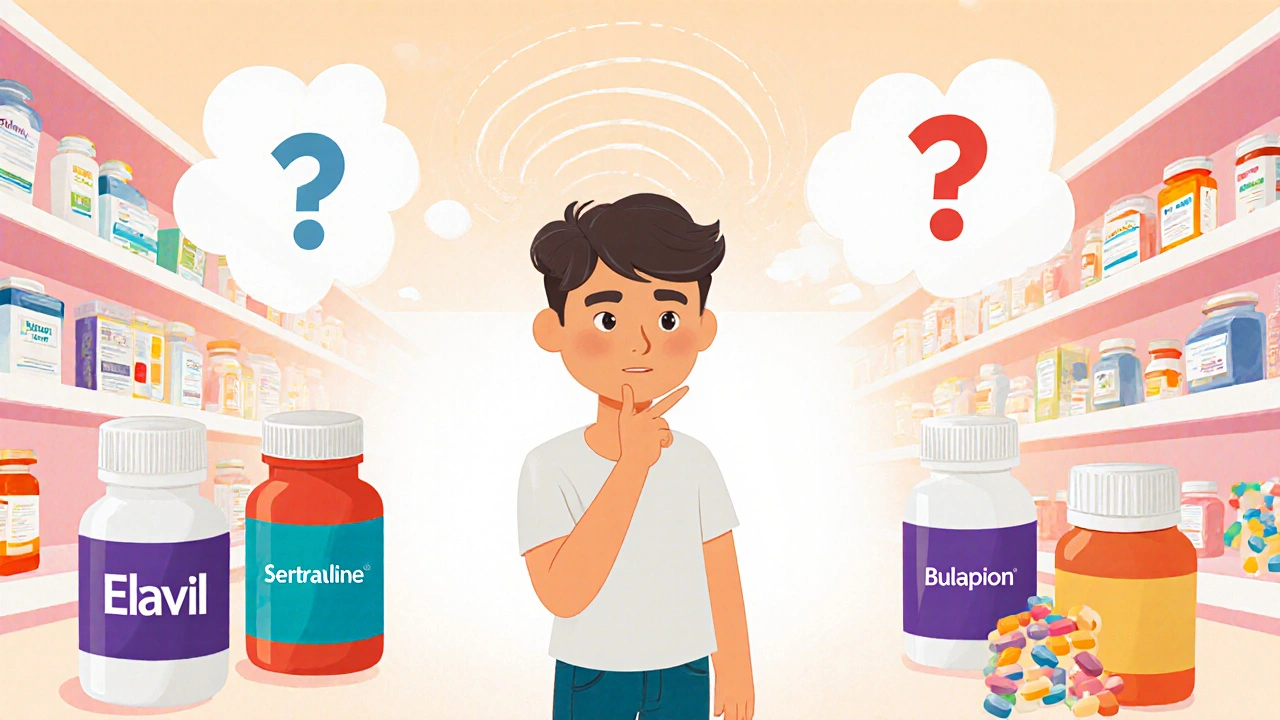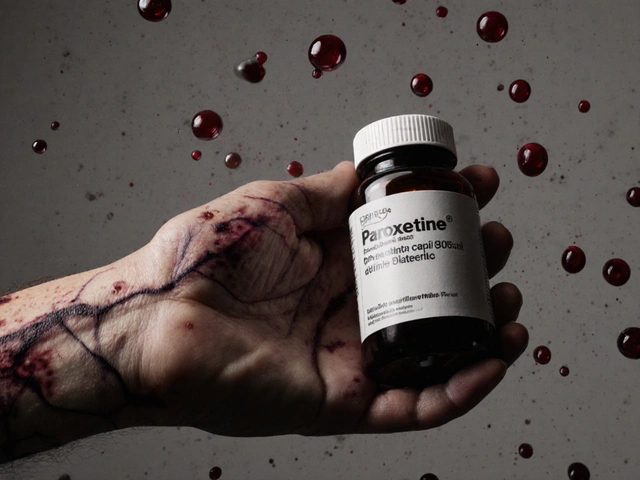Antidepressant Comparison Tool
Enter your information above and click "Find Best Match" to see personalized recommendations.
- Elavil is particularly effective for neuropathic pain and migraine prophylaxis
- SSRIs like sertraline often have fewer sedative effects but may cause sexual side effects
- SNRIs like venlafaxine can raise blood pressure
- Bupropion may help with low energy and smoking cessation
- Elavil has higher risk for older adults due to anticholinergic side effects
Feeling stuck between a list of antidepressants is more common than you think. You might have heard that Elavil can help with both mood and chronic pain, but you’re also seeing names like sertraline, venlafaxine, and bupropion pop up everywhere. This guide breaks down exactly how Elavil (Amitriptyline) stacks up against the most popular alternatives, so you can decide what fits your needs without getting lost in medical jargon.
What is Elavil (Amitriptyline)?
Elavil (Amitriptyline) is a tricyclic antidepressant (TCA) that works by boosting the levels of serotonin and norepinephrine in the brain. It was first approved in the 1960s and has since become a go‑to option not just for depression but also for migraines, neuropathic pain, and certain sleep disorders.
How Do the Alternatives Differ?
Before diving into side‑by‑side numbers, let’s look at the big families of drugs you’ll encounter.
- Selective serotonin reuptake inhibitors (SSRIs) - e.g., sertraline, fluoxetine. They mainly increase serotonin.
- Serotonin‑norepinephrine reuptake inhibitors (SNRIs) - e.g., venlafaxine, duloxetine. They lift both serotonin and norepinephrine.
- Atypical antidepressants - e.g., bupropion, mirtazapine. Their mechanisms vary widely, from dopamine reuptake inhibition to histamine blocking.
Each class has a different side‑effect profile, onset speed, and secondary uses, which is why a direct comparison helps.
Mechanism of Action: Elavil vs. the Rest
Elavil blocks the reuptake of both serotonin and norepinephrine, but it also affects histamine and acetylcholine receptors. That broad activity explains why it can make you drowsy or cause dry mouth.
SSRIs such as Sertraline focus almost exclusively on serotonin, giving a cleaner side‑effect slate for many people.
SNRIs like Venlafaxine sit in the middle, offering dual action without the heavy antihistamine hit.
Atypicals vary: Bupropion raises dopamine and norepinephrine, while Mirtazapine blocks certain serotonin receptors and boosts histamine, often leading to weight gain.
Typical Dosing and Onset of Relief
Elavil starts at 10-25mg at bedtime, slowly titrating up to 150mg daily. Noticeable mood improvement often appears after 2-4 weeks, but pain relief can take up to 6 weeks.
Sertraline is usually started at 50mg once daily, with a therapeutic window of 4-6 weeks. Venlafaxine kicks off at 37.5mg and may need 5-7 weeks for full effect. Bupropion begins at 150mg and can show benefits within 1-2 weeks for energy and concentration.
Side‑Effect Snapshot
| Drug | Common Side‑Effects | Serious Risks | Best For |
|---|---|---|---|
| Elavil (Amitriptyline) | Drowsiness, dry mouth, constipation, weight gain | Cardiac arrhythmia, overdose toxicity | Neuropathic pain, migraine prophylaxis |
| Sertraline | Nausea, insomnia, sexual dysfunction | Serotonin syndrome (rare) | Major depressive disorder, anxiety |
| Venlafaxine | Elevated blood pressure, nausea, sweating | Hypertensive crisis, withdrawal syndrome | Pain‑related depression, severe anxiety |
| Bupropion | Insomnia, dry mouth, tremor | Seizure risk at high doses | Low‑energy depression, smoking cessation |
Notice how Elavil’s antihistamine effect leads to drowsiness, which can be a blessing if you struggle with insomnia but a curse if you need daytime alertness.
Efficacy: How Well Does Each Drug Work?
Clinical trials consistently rank SSRIs and SNRIs slightly ahead of TCAs for pure mood improvement, mainly because they have fewer drop‑out rates. However, when you factor in Elavil’s pain‑relieving properties, the overall benefit score can surpass a TCA‑only view. For patients with comorbid chronic pain, Elavil often outperforms sertraline or venlafaxine even if mood scores are similar.
In a 2022 head‑to‑head study of 1,200 patients with diabetic neuropathy, 68% of the Elavil group reported at least a 30% pain reduction versus 52% on duloxetine (an SNRI). That same study showed comparable depression score drops across all arms.
Safety Concerns and Who Should Avoid Elavil
Because Elavil blocks multiple receptors, it can interact with a wide range of medications: antihistamines, anticholinergics, and certain heart drugs. People with a history of arrhythmia, recent heart attack, or uncontrolled epilepsy should steer clear.
SSRIs like sertraline are generally safer for cardiac patients but still require caution with other serotonergic drugs (e.g., triptans). Venlafaxine raises blood pressure, so regular monitoring is a must for hypertensive patients.
Bupropion avoids many serotonergic pitfalls, making it a solid choice for anyone on MAO‑inhibitors, but it isn’t suitable for those with seizure disorders.
Cost and Accessibility
Elavil is now off‑patent and widely available as a generic, typically costing $0.10‑$0.20 per tablet in the U.S. Sertraline and venlafaxine are similarly cheap on generic forms. Bupropion can be a bit pricier, averaging $0.30 per tablet, especially for the extended‑release version.
Insurance coverage is usually good for all four, but some plans place stricter prior‑authorization steps on TCAs because of their safety profile.
Decision Checklist: Is Elavil Right for You?
- Do you need help with chronic pain or migraines? Yes → Elavil.
- Are you prone to daytime drowsiness? No → consider an SSRI or SNRI.
- Do you have a heart condition or are you on cardiac meds? No → avoid Elavil.
- Is sexual dysfunction a major concern? Yes → try bupropion or an SSRI with lower sexual side‑effects.
- Do you need rapid energy boost? Yes → bupropion.
Ask your prescriber to weigh these factors against your personal medical history. Often a short trial (4‑6 weeks) at a low dose can reveal whether Elavil’s benefits outweigh its sedating side‑effects.
Key Takeaways
- Elavil is a versatile TCA ideal for mood, pain, and sleep issues.
- SSRIs (sertraline, fluoxetine) are generally gentler for pure depression.
- SNRIs (venlafaxine) bridge mood and pain but watch blood pressure.
- Atypicals (bupropion, mirtazapine) offer unique benefits for energy or appetite.
- Cost is low across the board; safety and side‑effect profiles should drive the final choice.
Frequently Asked Questions
Can I take Elavil with a selective serotonin reuptake inhibitor?
Combining a TCA like Elavil with an SSRI can increase the risk of serotonin syndrome, a rare but serious condition. Doctors sometimes add a low‑dose SSRI for specific reasons, but it requires close monitoring.
Why does Elavil make me sleepy?
Elavil blocks histamine receptors, which are involved in wakefulness. This antihistamine effect is why many patients take it at night to help with insomnia.
Is Elavil safe for older adults?
Older adults are more sensitive to anticholinergic side effects (dry mouth, constipation, confusion). Doctors often start at the lowest possible dose and may prefer an SSRI or SNRI for this age group.
What should I do if I miss a dose of Elavil?
Take the missed tablet as soon as you remember, unless it’s close to your next dose. In that case, skip the missed one and continue with the regular schedule-don’t double‑dose.
How long can I stay on Elavil?
There’s no fixed limit; many patients stay on it for years if it controls symptoms and side effects are manageable. Regular check‑ups are essential to reassess heart health and overall well‑being.






Emily Rankin
16 October 2025 - 20:40 PM
Imagine standing at a fork in the road of mental health, each path lined with a different pill bottle. Elavil offers a quiet lull that can soothe both mind and body, especially when chronic pain gnaws at the edges of daylight. Its antihistamine veil may feel like a gentle night‑time blanket, turning restless thoughts into a softer rhythm. Yet the same veil can turn into a fog if you need to stay sharp for work or school. Embrace the possibility, weigh the trade‑offs, and let your inner compass guide the choice.
Rebecca Mitchell
16 October 2025 - 22:03 PM
Elavil works but watch the drowsiness.
Roberta Makaravage
16 October 2025 - 23:26 PM
Let’s get straight to the facts: Elavil blocks serotonin, norepinephrine, histamine, and acetylcholine, making it a pharmacological Swiss army knife 😊. This broad receptor profile explains why you may feel both uplifted and sleepy, a side‑effect combo that many newer SSRIs simply don’t have 😏. Its analgesic properties are backed by dozens of trials, especially in diabetic neuropathy where it outperforms duloxetine. However, the cardiac risks are non‑trivial, so a cardiology clearance is mandatory before you start. Bottom line: it’s powerful, but powerful demands respect.
Katie Henry
17 October 2025 - 00:50 AM
Dear readers, the decision matrix for antidepressants must consider both efficacy and tolerability. Elavil’s dual action makes it uniquely suited for patients whose pain syndromes coexist with depressive symptoms. The dosage titration, beginning at ten milligrams and ascending cautiously, mitigates the risk of orthostatic hypotension. In comparison, sertraline’s more selective mechanism often results in fewer anticholinergic complications. Thus, a thorough assessment of comorbid conditions remains the cornerstone of personalized therapy.
CHIRAG AGARWAL
17 October 2025 - 02:13 AM
Honestly, most of these drugs are just chemical mood‑shifters and the hype around Elavil is overblown.
genevieve gaudet
17 October 2025 - 03:36 AM
Yo, if u got chronic migraines, Elavil can be a game changer, but dont forget it can make u feel like a sloth during the day. It’s cheap af and works 24/7 once you find the right dose. Just start low, bro, and watch for that dry mouth vibe.
Tom Green
17 October 2025 - 05:00 AM
Hey folks, I’ve seen patients transition from SSRIs to Elavil when pain becomes the dominant complaint, and the outcomes are often impressive. The key is a slow titration and consistent follow‑up to monitor blood pressure and cardiac markers. Encourage your prescriber to check for drug interactions, especially with antihistamines or other anticholinergics. Sharing experiences can demystify the process and empower you to make an informed choice. Stay proactive and keep the dialogue open with your healthcare team.
Winston Bar
17 October 2025 - 06:23 AM
Elavil is just a relic of the past, a bulky molecule that drags you into a fog while promising relief. Most modern agents give you clearer heads up with fewer side‑effects.
Russell Abelido
17 October 2025 - 07:46 AM
I hear the concerns about drowsiness, the talk of cardiac risk, and the endless checklist of side‑effects, and I feel you. 🫂 First, the sedative quality of Elavil can be an ally when insomnia keeps you wired at night; it can turn restless tossing into a peaceful slumber. Second, the pain‑modulating action taps into norepinephrine pathways that many SSRIs simply ignore, giving you a two‑for‑one effect that is hard to find elsewhere. Third, while the antihistamine effect may cloud daytime alertness, a simple schedule adjustment-taking it at bedtime-often solves that problem without sacrificing therapeutic benefit. Fourth, the risk of arrhythmia is real but statistically low in patients without pre‑existing heart disease, especially when the dose stays under the upper therapeutic ceiling. Fifth, the anticholinergic load, often blamed for dry mouth and constipation, can be managed with hydration and dietary fiber, a small price for the relief you may gain. Sixth, many insurers consider Elavil a cost‑effective option, saving you dollars compared to brand‑name SNRIs. Seventh, for those battling diabetic neuropathy, studies show a higher proportion achieving meaningful pain reduction compared to duloxetine, which can tip the scales in its favor. Eighth, the emotional weight of chronic pain often fuels depressive thoughts; eliminating that physical burden can lift mood indirectly, a synergy rarely achieved by serotonin‑only agents. Ninth, the gradual titration schedule-starting at ten milligrams and moving up slowly-allows your body to adapt and reduces abrupt side‑effects. Tenth, regular follow‑up appointments give your clinician a chance to monitor blood pressure, heart rhythm, and overall response, ensuring safety. Eleventh, the drug’s half‑life provides a stable plasma level, meaning fewer peaks and troughs that can destabilize mood. Twelfth, many patients report that the combination of improved sleep and reduced pain creates a virtuous cycle of better daily functioning. Thirteenth, if you ever need to discontinue, a taper plan can minimize withdrawal and rebound symptoms. Fourteenth, the flexibility of Elavil to address both mood and somatic complaints makes it a valuable tool in a clinician’s toolbox. Fifteenth, remember that every medication carries trade‑offs, and the art lies in matching those trade‑offs to your personal priorities. Finally, keep an open line with your prescriber, share any new symptoms, and trust that adjustments can be made along the journey. 😊
Steve Holmes
17 October 2025 - 09:10 AM
Wow!!! This guide really breaks down the options in a clear way!!! I love how the side‑effect tables let you compare at a glance!!! The dosing schedules are spot on, and the cost discussion is super helpful!!! Anyone trying to decide now has a solid roadmap to follow!!!
Lauren Sproule
17 October 2025 - 10:33 AM
Totally agree, Roberta-Elavil’s multitasking can be a blessing when you’re juggling pain and mood 🌟. Just remember to keep an eye on that dry mouth, maybe chew sugar‑free gum. It’s all about finding the sweet spot that works for you.
Patricia Echegaray
17 October 2025 - 11:56 AM
Don’t be fooled by the lazy dismissal, the big pharma machines push Elavil as a cheap fix while hiding the long‑term cardiac fallout. They cherry‑pick studies, fund the favorable trials, and bury the ones that show heart risks. Stay vigilant, question the narratives, and demand full transparency before you swallow any pill.
Kevin Adams
17 October 2025 - 13:20 PM
Ah, the wandering soul seeks relief, yet the cheap elixir may bind you in invisible chains-dry mouth, lethargy, a phantom of dependence. Embrace the paradox: quick fix versus slow, mindful healing. Choose wisely, lest the road you tread become a theater of regret.
Joanna Mensch
17 October 2025 - 14:43 PM
Appreciate the detailed rundown, it’s a lot to take in.
Nickolas Mark Ewald
17 October 2025 - 16:06 PM
Thanks for the summary, it makes the comparison easy to understand.
Chris Beck
17 October 2025 - 17:30 PM
Look, the conspiracy talk is overblown-Elavil’s risks are documented, not hidden. Doctors weigh benefits vs. harms, that’s how medicine works. Keep the focus on data, not fear‑mongering.